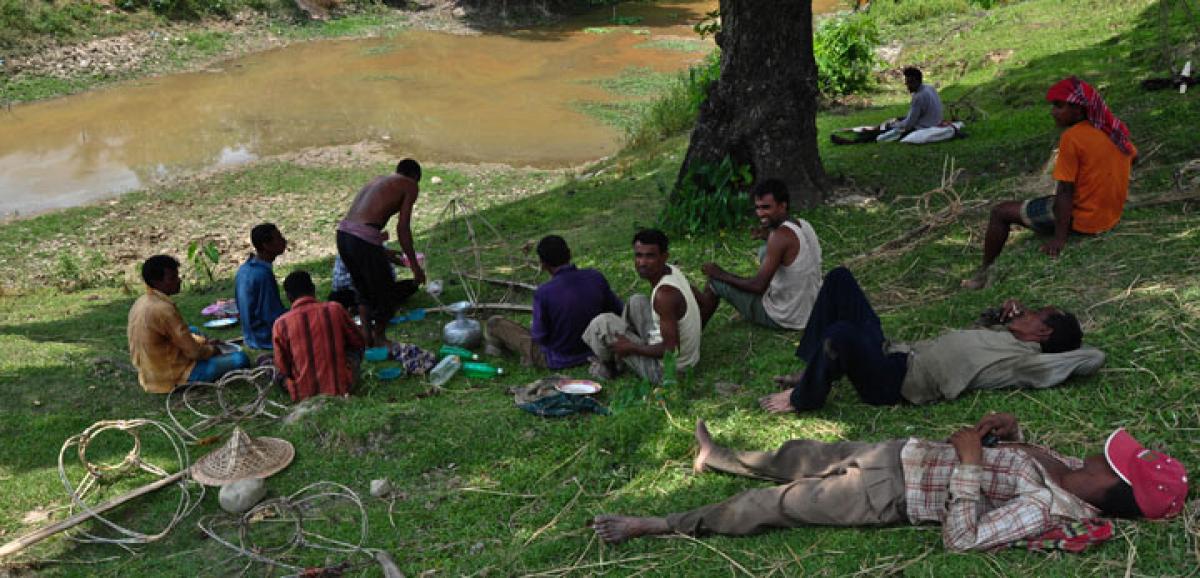Live
- NASA Tracks Five Giant Asteroids on Close Approach to Earth Today
- Pushpa 2 Hits ₹1000 Crore in 6 Days: How It Compares to Other Top Indian Films
- Vivo X200 and X200 Pro Launched in India: Price, Specifications, and Features
- Nitin Gadkari Admits Feeling Embarrassed at Global Summits Over Rising Road Accidents in India
- Comprehensive Review on Indiramma Housing Survey and Welfare Initiatives Conducted via Video Conference
- Jogulamba Temple Records Rs 1.06 Crore Hundi Revenue in 150 Days
- Opposition Slams ‘One Nation, One Election’ Bill as Anti-Democratic; BJP Allies Support the Move
- Celebrate Karthigai Maha Deepam Virtually with Sri Mandir’s LIVE Darshan Experience
- BJP Extends Support to Samagra Shiksha Abhiyan Employees' Strike, Demands Immediate Regularization and Welfare Benefits
- Dr. M. Priyanka Stresses Quality Education, Nutritious Meals, and Cleanliness in Schools
Just In

For them, the land across the border once seemed to be the hope for a better life. But once they crossed over and got caught for crimes, their timeline was frozen in the confines of Indian juvenile homes.
For them, the land across the border once seemed to be the hope for a better life. But once they crossed over and got caught for crimes, their timeline was frozen in the confines of Indian juvenile homes.
 Milton, Sattar and hundreds of other Bangladeshi teens had crossed over to the Indian side from Bangladesh for a better life, but they had run-ins with the law enforces in India and finally landed up in juvenile homes of Tripura, India's northeastern state that shares a long border with Bangladesh.
Milton, Sattar and hundreds of other Bangladeshi teens had crossed over to the Indian side from Bangladesh for a better life, but they had run-ins with the law enforces in India and finally landed up in juvenile homes of Tripura, India's northeastern state that shares a long border with Bangladesh.
Now a bleak and uncertain future stares at them as they wait to go back home and battle it out there. "After my mother's (Payara Bibi) death seven years ago, my stepmother started behaving ruthlessly with me. My father is a rickshaw puller, he is unable to feed us properly too.
We are eleven brothers and sisters," 14-years-old Milton Mia (changed name) told this correspondent at the Narsingarh juvenile home. Milton said: "One day I along with two other friends 'mistakenly' crossed over to India. A few days later, I along with others had stolen some goods from a house in Agartala. Police then detained me."
After taking mandatory written permission from the Tripura government's social welfare department, this correspondent talked to the children lodged in the Narsingarh home, where 14 children convicted for various crimes, are lodged. "I am keen to return to my home at Sasankacha (under Kotwali police station) in Comilla district (eastern Bangladesh).
Though everyone here loves me, I do not want to stay here (at the juvenile home)," said Milton, who's parents shockingly never enquired about him. Of Tripura's 1,018 km outer periphery, 84 percent (856 km) is the international border with Bangladesh. In the domestic sector, Tripura has a 109-km border with Mizoram and 53 km with Assam. A large part of the border is unfenced and riverine.
Tripura Police's Mobile Task Force (MTF) either instantly or after the conviction period handed down by the courts, hands over the illegal infiltrators to Border Guard Bangladesh (BGB) through India's Border Security Force (BSF). According to Tripura Police records, over 191,200 infiltrators, including women and children, have been pushed back to Bangladesh during the past 41 years (up to September).
"The BGB officials officially or unofficially never admit about their citizens who illegally cross over to India and become involved in various offences in bordering states," MTF chief L. Darlong said. "As per the Tripura government and union home ministry's advisories and orders, we are pushing back the foreign nationals either after completion of their conviction or instantly after they are apprehended.
Though the push back process is done through BSF, the BGB never officially admit or accept their nationals," he added. "In most cases, we try to overlook the presence of Bangladeshi children in our state. We just detain them and push them back to their country. When these children committed crimes, we had to detain them and produce in court under the juvenile act," the MTF head said.
According to Fulan Bhattacharjee, social activist, writer and councilor of the Agartala Municipal Corporation, involvement of children, specially Bangladeshi teens in crimes, trafficking, smuggling and other nefarious activities is a very complex problem of the northeastern states, which share a 5,437-km international boundary with China, Myanmar, Bhutan, Bangladesh and Nepal. Most parts of the border are unfenced, terrain-crammed and porous.
Tripura High Court Chief Justice Deepak Gupta recently visited the Narsingarh juvenile home and asked the authorities to deport or push back the Bangladeshi children through the country's diplomatic mission in India. Legal expert Biduit Datta, who is associated with the juvenile home as a lawyer, said: "Though deportation or push back of children to their respective countries is a time-consuming affair, this will help the children secure their future."
By Sujit Chakraborty

© 2024 Hyderabad Media House Limited/The Hans India. All rights reserved. Powered by hocalwire.com







